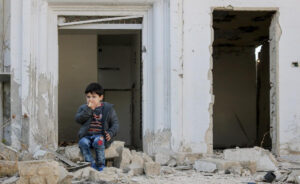Compassionate Care in Leadership:
Nurturing Humanity in a Tumultuous World
In a world marked by conflict and escalating geopolitical tension, the practice of compassionate care in leadership becomes increasingly critical and deeply transformative. Compassionate care refers to a leadership ethic, attitude, and action-orientation that prioritizes the physical, emotional, and psychological well-being of others. Compassionate care goes beyond aiding; it requires respect for the dignity and humanity of those who are vulnerable.
 In this issue, we highlight a program which provides education and certification in Compassionate Care. The BELOVED Compassion Network (BCN) seeks to educate leaders in pastoral and lay leadership, equipping individuals with skills to impact positive change. Leaders who approach conflict with compassion understand the importance of active listening and creating safe space for dialogue.
In this issue, we highlight a program which provides education and certification in Compassionate Care. The BELOVED Compassion Network (BCN) seeks to educate leaders in pastoral and lay leadership, equipping individuals with skills to impact positive change. Leaders who approach conflict with compassion understand the importance of active listening and creating safe space for dialogue.
As the world grapples with ongoing conflict and rising tensions, the importance of compassionate care in leadership cannot be overstated. Leaders who prioritize empathy and compassion have the skills to promote understanding, humanize individuals and communities, build trust, and foster collaboration. By nurturing humanity, even in the most challenging circumstances, compassionate leaders can pave the way for lasting peace, and ultimately, healing. HELM will partner with BCN to make this training available to students at the undergraduate, graduate, and post-graduate level(s).
Additionally, HELM is looking forward to our annual Fall Retreat with the Leadership Fellows Program in early November. Our HELM Leadership Fellows are undergraduate students engaging the following topics throughout their 4-year college experience: Community (Year 1), Transformation (Year 2), Global Awareness (Year 3), and Vocation/Mentoring (Year 4). The Fall Retreat is intended to be an immersive, contextual experience.
This year the Fellows will travel to Seattle, WA. Dr. Jack Hill will lead them in a study on the impact of the “None-Zone” in the Pacific Northwest, and more broadly in the global context. Students will also dialogue with Rev. Greg Turk, minister at All Pilgrims Christian Church in Capitol Hill, learning to see and love all of God’s people living within the layers of an urban context.
Cohort mentors and book discussion leaders are also an integral part of the fellows’ leadership training experience. Students will be privileged to spend time with this year’s mentors and discussion leaders: Rev. Dr. Ben Bohren (Mentor/Book Discussion Leader), Rev. Christian Watkins (Mentor), Mr. Joshua Mata (Mentor), Ms. Lonora Graves (Mentor), Rev. Laurie Rudel (Book Discussion Leader), Rev. Larry J. Morris III (Book Discussion Leader), and Rev. Colton D. Lott (Book Discussion Leader). We want to take this opportunity to thank them for their dedication to educating young leaders at the intersection of faith and society.
In this issue, you will also be introduced to the upcoming Thanksgiving Offering, a Disciples Special Offering, which is dedicated to supporting students through our related higher education institutions. HELM works with fifteen colleges and universities as well as seven seminaries and divinity houses. Your generous offering on Sunday, November 12th and November 19th will go directly to our affiliated institutions in support of their mission and to strengthen Disciples on Campus. Please join us in participating in this special offering.
 Finally, I close this reflection where we began. We are living in a tumultuous time. Unfolding narratives of war and rumors of war, political chaos, injustice, and suffering humanity have become ever-present realities. Please look for the shared links included in this issue to Global Ministries and Week of Compassion for church-wide updated information and action appeals.
Finally, I close this reflection where we began. We are living in a tumultuous time. Unfolding narratives of war and rumors of war, political chaos, injustice, and suffering humanity have become ever-present realities. Please look for the shared links included in this issue to Global Ministries and Week of Compassion for church-wide updated information and action appeals.
In times such as these, we turn to our leadership. The question is, however, what kind of leaders do we put in the positions of power? HELM remains dedicated to partnering with Christian Church (Disciples of Christ), ecumenical partners, affiliated institutions, and congregational, regional, and general partners to prepare leaders for this world who have critical thinking skills, an ability to be a voice for justice, and a profound sense of ethics rooted in compassionate care.
